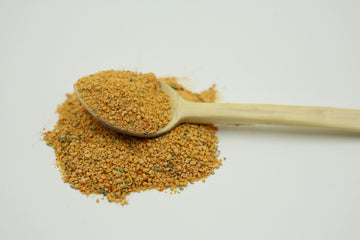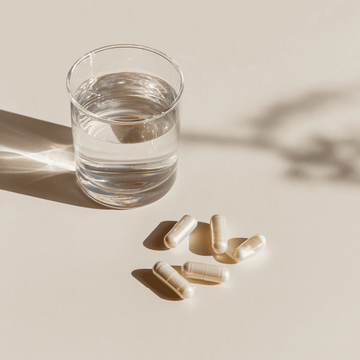Micronutrients are vital nutrients that support your body in a variety of ways, yet many people don't know exactly what micronutrients are, how they work, or how to meet their daily needs. In this article, you'll learn everything you need to know: from the different types of micronutrients and their functions to the best sources and tips for a balanced diet. Find out the answers to the most important questions right from the start:
- What exactly are micronutrients?
- What micronutrients are there?
- Why are they so important for health?
- How do I recognize a defect?
- How can I best meet my needs?
This comprehensive guide provides you with all the answers and valuable tips on the topic of micronutrients!
What are micronutrients? Definition & Meaning
The term "micronutrients" encompasses all nutrients that the body needs in relatively small amounts, but which are essential for life. While macronutrients (such as carbohydrates, fats, and proteins) provide energy, micronutrients primarily perform regulatory and protective functions.
Micronutrients include:
- Vitamins
- Minerals
- Trace elements
- Secondary plant substances (sometimes also included)
Micronutrients ensure that metabolic processes function, the immune system remains strong and every cell functions optimally.
Difference between micronutrients and macronutrients
The difference lies in the required quantity and function:
- Macronutrients: Energy sources, required in gram amounts daily
- Micronutrients: Necessary for numerous functions, required in milligram to microgram amounts
Micronutrients are also known as essential nutrients, vital substances, micronutrition, or "bioactive substances." They include vitamins such as vitamin C, minerals such as magnesium, and trace elements such as zinc.

The most important micronutrients at a glance
Vitamins
Vitamins are organic compounds that are essential for life and usually cannot be produced by the body itself. A distinction is made between:
- Fat-soluble vitamins: A, D, E, K (can be stored)
- Water-soluble vitamins: B vitamins, vitamin C (are hardly stored)
Tasks & functions of vitamins
Vitamins are involved in almost all metabolic processes. They support the immune system, energy metabolism, cell division, and much more.
Minerals
Minerals are inorganic nutrients that are needed in larger quantities than trace elements. Examples include:
- Calcium: important for bones and teeth
- Magnesium : essential for muscles and nerves
- Potassium and sodium: regulate fluid balance
Trace elements
Trace elements are minerals that the body only needs in very small amounts. Nevertheless, they are essential!
- Zinc: supports the immune system and wound healing
- Selenium: protects cells from oxidative stress
- Iron: essential for oxygen transport in the blood
- Copper, manganese, chromium, molybdenum, iodine, fluorine – and many more!
Why are micronutrients so important?
The body often cannot produce micronutrients itself and must regularly obtain them through food. A lack of micronutrients can lead to deficiency symptoms such as:
- Tiredness and fatigue
- Difficulty concentrating
- Susceptibility to infection
- Muscle cramps, hair loss or skin problems
An optimal micronutrient status is therefore crucial for your health, performance and well-being.

What is the daily requirement of micronutrients?
Individual daily requirements depend on age, gender, life situation, health, and activity level. The German Nutrition Society (DGE) provides reference values for the most important micronutrients.
Example adults:
- Vitamin C: 95–110 mg/day
- Vitamin D: 20 µg/day (if no self-production)
- Magnesium: 300–400 mg/day
- Iron: 10–15 mg/day
- Calcium: 1,000 mg/day
- Zinc: 7–16 mg/day
Tip : There is often an increased need during stress, intensive physical activity, after illness, during pregnancy and in old age.
Micronutrients in food: The best sources
A varied, fresh diet provides you with optimal micronutrients. Rich in vitamins and minerals are:
- Fresh fruits and vegetables (e.g. broccoli, spinach, peppers, berries)
- Nuts and seeds (e.g. almonds, walnuts, chia seeds)
- Whole grain products
- Legumes (e.g. lentils, chickpeas)
- Low-fat dairy products
- Lean meat and fish
Extra tip :
Protect the micronutrients! Vitamins are sensitive to light, oxygen, and heat. Prepare your vegetables as gently as possible (e.g., steam instead of boil) and store fruits and vegetables in a cool, dark place.
Detecting micronutrient deficiencies: symptoms and risk groups
A micronutrient deficiency often remains undetected for a long time because the symptoms are non-specific:
- Chronic exhaustion, loss of concentration
- Brittle nails, hair loss, dry skin
- Frequent infections or poor wound healing
- Muscle twitching, cramps or sleep disturbances
Risk groups for micronutrient deficiencies:
- People with an unbalanced diet (e.g. fast food, diets)
- Vegetarians or vegans (e.g. vitamin B12, iron)
- Pregnant women, breastfeeding women, seniors
- Chronically ill people, people with gastrointestinal diseases
Dietary supplements: useful or unnecessary?
A balanced diet is usually sufficient. In certain life situations or in cases of diagnosed deficiencies, high-quality dietary supplements can help ensure adequate micronutrient intake.
Recommendation: If you want to specifically support your electrolyte balance, for example during physical exertion or heavy sweating, we recommend our Amino Electrolyte as a useful supplement.

Micronutrients and their effects on health and performance
- The correct supply of micronutrients directly influences physical well-being:
Strong immune system: Vitamins and minerals activate defenses
- Powerful muscles & nerves: Magnesium, potassium, calcium ensure healthy muscles and nerve function
- Healthy skin, hair & nails: Zinc, biotin and iron promote beauty from within
- Good mood and ability to concentrate: B vitamins increase energy and focused thinking
Secondary plant substances, the underestimated micronutrients
Often forgotten: Plants also contain so-called secondary plant substances (e.g., carotenoids, flavonoids, polyphenols). These have powerful antioxidant and anti-inflammatory properties and also promote health. Regularly eating fruits and vegetables in a variety of colors pays off twice!
FAQ: Frequently asked questions about micronutrients
What are micronutrients, simply explained?
Micronutrients are essential nutrients such as vitamins and minerals that are absorbed in small amounts through food and control important bodily functions.
Can I meet my micronutrient needs through diet?
Yes, a varied, plant-based diet is usually sufficient. However, some groups may need additional support.
How do I know if I'm not getting enough micronutrients?
Typical symptoms include fatigue, susceptibility to infections, difficulty concentrating, brittle nails, hair loss, or cramps. To clarify the situation, a doctor can perform blood tests to determine a possible deficiency.
What is the difference between vitamins, minerals and trace elements?
Vitamins are organic compounds that are essential in small amounts. Minerals and trace elements are inorganic; you need minerals in comparatively larger amounts (like magnesium or calcium), while trace elements are needed only in very tiny amounts (like zinc or selenium).
Do I need nutritional supplements?
Most people who eat a balanced and varied diet don't need supplements. For certain groups, such as pregnant women, seniors, people with chronic illnesses, or athletes, dietary supplements can be targeted and beneficial. If in doubt, seek medical advice!
Can you overdose on micronutrients?
Yes, especially fat-soluble vitamins and certain minerals can be harmful if consumed in excess. More isn't always better: Stick to the recommended guidelines and don't exceed them without good reason.
When is a micronutrient deficiency likely?
If you have a very unbalanced diet, are frequently stressed, regularly consume alcohol, or take certain medications, your needs may increase. You should also pay special attention to your intake during certain illnesses or life phases (such as pregnancy).
Which is better: micronutrients from food or from supplements?
Always preferred: natural sources! The combination of vitamins, minerals, and phytochemicals in real foods often works synergistically and is particularly effective. Supplements can provide targeted support, ideally after consulting a doctor.
Conclusion: Micronutrients are small but vital!
Micronutrients such as vitamins, minerals, and trace elements are essential for your health, performance, and well-being. A varied, fresh diet is the key to optimal nutrition. Listen to your body, watch for signs of deficiency, and, if necessary, take high-quality supplements such as Amino electrolyte back.
Learn more on our website about nutrition, nutrients, and health so you can stay well-nourished and vital in the future!



